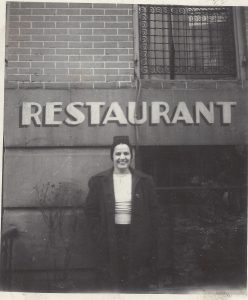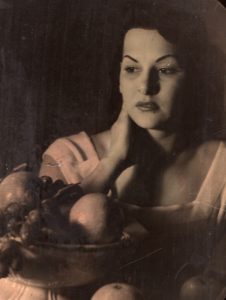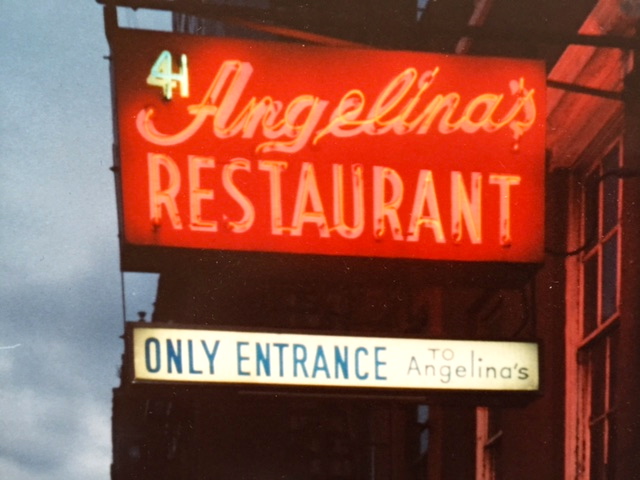The restaurant was established at 41 Greenwich Avenue between Perry and Charles Streets in NYC in 1936, where it remained, owned and operated by my mother’s family for more than fifty years.
Angelina Morra, the namesake, was my great grandmother. She was an orphan and illiterate who came to America fromPiedmont, Italy in the early 1900’s, like so many other European immigrants in search of a better life. According to family folklore, she worked fourteen-hour days first as a scrubwoman, then a laundress in a rooming house and eventually she became the proprietress of a speakeasy during the Prohibition. She literally “stuffed her mattress” amassing what was a small fortune at the time. The restaurant was purchased and financed initially by Angelina. But the operation of the restaurant was entrusted to her daughter Emilia, as a means for Emilia to support herself and her three children while her husband, Carlo, was serving three years in prison for embezzling money from the bank at which he was employed as a loan officer. Emilia and Carlo were my grandparents. Their middle child, Gloria, who would one day be my mother, was a life-long waitress at the restaurant. The other two children, sons named Bruno and Mario, also spent their lives employed in the family business.
Everyone had a moniker back in those days. Angelina, the matriarch, was called Nona and her daughter, Emilia was called Angie by the customers – everyone just assumed she was the namesake of the restaurant – but the family called her Ma and her husband, Carlo, was called Pa. My mother, Gloria was known as Glo-girl; her first husband, Pete, was PZ and her second husband, my father, Tom, was known as The Greek. Glo-girl and The Greek met and were quickly married in 1957 but split up only four months after I was born in October of 1961. From the time I was an infant until I started kindergarten, my mother brought me to the restaurant whenever she went to work her waitress shifts and it was often the location at which my father picked me up and dropped me off on visitation days. During the first five years of my life I spent a least a portion of every day in Angelina’s Restaurant.
E ach night at 5pm, the start of the dinner hour, Ma entered the restaurant from the hallway through the fire exit door. She and Pa lived in the apartment one flight up just above the restaurant. Pa would already be in the restaurant from earlier in the day, prepping food for the evening. After he was released from prison his wife hired him as the salad man, the second to lowest job on the organizational chart, senior only to the porter/dishwasher. Ma never forgave Pa for the humiliation caused by his transgression and not a day went by that she did not remind him with verbal abuse and public criticism. Pa, an educated man and perfect gentleman, took it all in stride. “I love my wife,” he often said, “but I hate my boss.”
ach night at 5pm, the start of the dinner hour, Ma entered the restaurant from the hallway through the fire exit door. She and Pa lived in the apartment one flight up just above the restaurant. Pa would already be in the restaurant from earlier in the day, prepping food for the evening. After he was released from prison his wife hired him as the salad man, the second to lowest job on the organizational chart, senior only to the porter/dishwasher. Ma never forgave Pa for the humiliation caused by his transgression and not a day went by that she did not remind him with verbal abuse and public criticism. Pa, an educated man and perfect gentleman, took it all in stride. “I love my wife,” he often said, “but I hate my boss.”
Ma would take her seat at the family table and begin her nightly ritual of polishing flatware and wiping out glasses. From this central vantage point she could watch the entrance and immediately greet her customers upon their arrival, while also keeping an eye and ear on the happenings at the bar and in the kitchen behind her.
Instinctively, she would perk up when she heard the cash drawer bell ring and would casually walk to the bar to witness the transaction and make an inventory inspection, picking up a liquor bottle to see if the level of its contents matched the pencil mark she had made on the label at closing the night before. Not much got by Ma; at least she didn’t think so.
Pa sat with her, purposefully separating himself with his profile in anticipation of the berating he was sure to receive. I can picture him now, his back to the bar, the glowing stick of a Chesterfield non-filtered cigarette tautly suspended between the index and middle fingers of his right hand, thumb on his temple, elbow planted on the table. With his left hand, he absentmindedly rubbed and tugged the age worn skin that hung down from his neck as he gazed across the room, over the heads of the seated customers to a solitary window that faced out onto Greenwich Avenue. He would wait patiently for Ma to escort a guest to the rear patio dining room so that he could sneak to the bar, fill his demitasse cup with scotch, erase the pencil line and draw in a new one. Then he would summon a waiter to top off the cup with espresso, concealing the true contents of the cup before Ma returned to her post.
“I didn’t go to college for nothing,” he is said to have mumbled on more than one occasion as he made his way back to the family table.
The bar, complete with decorative top-rail and hidden cash drawer underneath, was custom designed and built by my Uncle Mario, Ma & Pa’s youngest son, a grown man who was known to all as Babe. Five cushioned barstools without backs were lined up in front of the bar. Before the customers arrived, the bar stools were the domain of Duchess, the evil black cat. Thought to be a female, the cat was brought to the vet to be spayed, where it was discovered to be a hermaphrodite. Perhaps the cat’s vicious demeanor could be attributed to this dual gender anomaly. Duchess had once lived in our apartment on 12th street, a few blocks away from the restaurant and was designated by my mother as a “watch-cat” since no one except her could safely enter the apartment unless the cat was locked up in a closet. But shortly after my birth, Duchess was sent to live in the restaurant basement after trying to attack me.
Duchess had a good memory and seemed aware that I was responsible for her banishment. Each time I entered the restaurant, I would look straight to the barstools to find Duchess prowling from stool to stool, her eyes fixed on me and emitting a soft growl that would crescendo into a piercing whine as I inched my way into the restaurant. I was petrified of that cat and wanted it gone, but Johnny the Chef said she was a good mouser and rewarded her well with plate scrapings. I am sure Duchess sensed my terror as she sat sentinel eagerly waiting for me to walk by close enough to take a swipe. I was happy when that cat died and laughed nervously at the running joke I was too young to really understand – that Duchess was a drunk and had died from cirrhosis of the liver – presumably from the wine in the scraps she was fed.
Until the 1980’s, Angelina’s had strict dress code – suit and tie for gentlemen and skirts or dresses for ladies. This made for an affluent and well dressed clientele, predominantly doctors affiliated with St. Vincent’s Hospital and their glamorous wives; detectives from the nearby Sixth Precinct, local politicians, parish priests and business owners; as well as the local bookies and loan sharks who dropped in throughout the evening to service the regulars respectively, saving them a trip to OTB or a local bank.
I remember these regular customers well. They would plant themselves on the same barstool and order the same drink every time while they traded one-liners or the hot tip of the day with each other and with Bruno, their confidant and mixologist who held court behind the bar. The bartender was Ma and Pa’s eldest son, but was just Uncle Boo-Boo to me. I was fascinated by the goings on at the bar and would stand in the corner trying to be inconspicuous, playing with the buttons on the cigarette machine, while I listened to the raunchy conversations; I watched with embarrassment from the corner of my eye, as a man slipped a hand onto a ladies thigh; I watched in disgust as my Uncle Boo-Boo squeezed a lime into a Bloody Mary with one hand and scratched his groin with the other.
“You’re a pretty little kid,” these regular customers would slur, giving  me the once over and licking the stirrers from their cocktails. “But that Glo-girl stops traffic on the street. She is one good lookin’ broad.” They referred to Ma and Pa’s middle child, my mother, Gloria; and she really was beautiful — stunning, in fact – with her jet black hair, high cheek bones, a smile full of bright white teeth and an hour-glass figure that she flaunted unabashedly. She was glamorous and extroverted and she always got whatever or whoever she wanted. But all of Glo-girl’s relationships were on her terms and heaven help you if you crossed her. When my mother decided she was done with my father, she changed the locks on the door to their apartment and that was the end of their married relationship.
me the once over and licking the stirrers from their cocktails. “But that Glo-girl stops traffic on the street. She is one good lookin’ broad.” They referred to Ma and Pa’s middle child, my mother, Gloria; and she really was beautiful — stunning, in fact – with her jet black hair, high cheek bones, a smile full of bright white teeth and an hour-glass figure that she flaunted unabashedly. She was glamorous and extroverted and she always got whatever or whoever she wanted. But all of Glo-girl’s relationships were on her terms and heaven help you if you crossed her. When my mother decided she was done with my father, she changed the locks on the door to their apartment and that was the end of their married relationship.
I was free to roam the restaurant as I pleased. During the day I would play for hours in the back dining patio. There was a wall-mounted fountain where water came from a lion’s mouth and into basin where fake plastic fish bobbed at the surface. The fountain kept me occupied for hours. When hungry, I would go to the kitchen to make an anchovy sandwich on Zito’s bread while I waited for Johnny to warm up some pastina en brodo. For dessert I would ask a waiter to lift me up so I could reach down into the freezer and help myself to a tortoni – a flimsy corrugated paper cup filled with vanilla ice cream topped with toasted coconut.
In the evenings I would mimic my grandmother in the front dining room, walking from table to table greeting and chatting with the customers, adding to the ambiance and charm that drew them our to family owned and operated establishment. On the surface, Ma loved all of her customers and offered them her charm and hospitality – no matter what her commentary behind their backs might have been. I watched and learned and was happy to do my part to enhance the dining experience of all of the customers.
I had a few favorite customers such as the pastor from St. Bernard’s Catholic Church. He seemed to enjoy my company and I was often invited to pull up a chair to chat with him and his dinner guests. They would start with benign questions like “what did I want to be when I grew up” but the conversation would inevitably evolve into my “innocently” sharing family secrets.
I was verbal and articulate at a young age, so skilled at spinning a yarn that the customers simply could not resist my entertaining stories – I had their undivided attention. They would lean down towards me to hear my hushed voice, their eyes wide with the scandal of it all, their hands cupped over their mouths in an attempt to muffle their gasps of shock and delight at my revelations. They would glance back at the family table with raised eyebrows where Ma would try to keep a smile on her face to conceal her fury while summoning my mother in Italian.
“Gloria! Get that little Greek away from my customers. She’s telling them EVERYTHING!”
“AN-ge-la!” Glo-girl would sing through the tightly gritted teeth of her glorious smile. “Come here now. Don’t bother the customers,” she’d say, walking towards me, her lips never breaking that Cheshire grin.
“Okay, Mommy,” I’d say, as I walked to meet her half-way across the crowded dining room finishing my sentence in a “whisper” – “Don’t worry, Mommy. I didn’t tell Father Fitzgerald you say F-U-C-K!”
I could hear and reveled in the customers bursts of laughter – even as we rounded the corner, her hand firmly gripped around my wrist to guide me back towards the bathroom where I knew I would be scolded and probably spanked. But it was always worth the adoring attention from the customers.
Angelina’s was my playground, the place I spent my formative years. I was a precocious child in a very grown-up world, where almost everyone, even the cat, was drunk.
[huge_it_gallery id=”2″]
